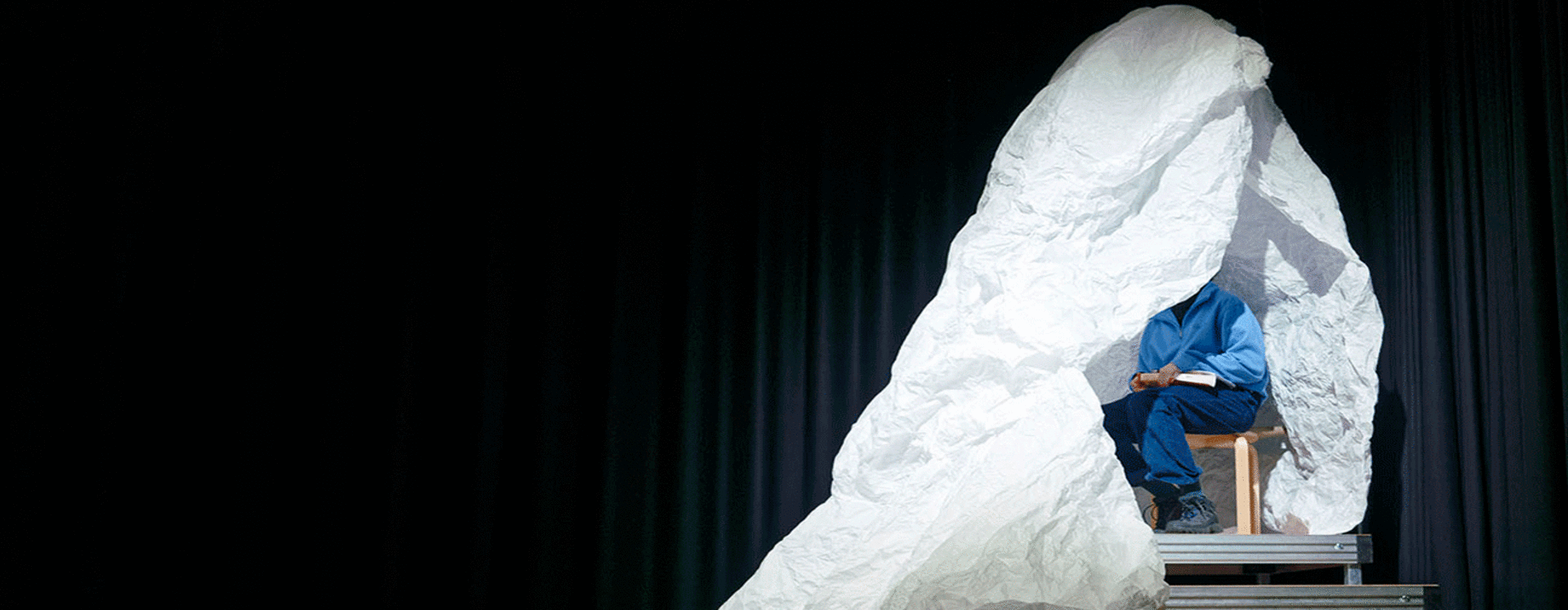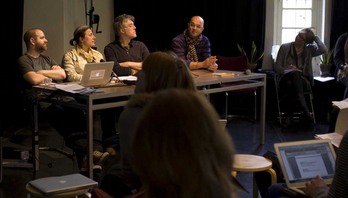“Action based research and the connective potential of exchange”
In today's rapidly changing and polarising reality, art and culture is necessary for a future-proof (pluralistic, fair and sustainable) society. More and more art professionals are exploring different ways to develop value-driven artistic practices. With the starting point: art that relates to the context in which it is initiated, produced and presented. Art that is meaningful. Art that causes a movement.
At the heart of these processes is the creative producer, a professional who establishes relationships between artists, communities and funders based on an artistic and social vision. It is a complex and layered role because of the convergence of different processes, strategies, (ethical) issues and relationships. At this complex intersection, it is possible to set something in motion in the world through imagination.
One place where these professionals find each other is at the DAS Creative Producing master's program. In this community of practice, perspectives are shared, habits are questioned, and unknown paths are explored with curiosity. It becomes visible and tangible that the power of (collective) practical research can further develop the method of creative producing.
Creative producing does not yet have a long tradition in the Netherlands. The current generation of professionals builds a collective narrative in order to exchange their experiences and know-how. They delve into current issues in society and art and make artistic proposals for alternative realities.
The issues of our time, however, are far too big to be understood from a purely Dutch perspective. A global lens is necessary to see through and overturn blind spots and ingrained habits. For this reason, we are working with our partners Watershed (Bristol), Royal Central School of Speech and Drama (RCSSD) (London) and the Kibii Foundation (Moengo) to develop a Global Research Network for Creative producers.
Competency development
The creative producing method was developed based on research abroad. However, the Dutch context of work has its own specific challenges. What is needed to implement this method decisively in the Netherlands? In educational terminology: what knowledge, skills and attitude must you possess in order to implement the method of working in the Dutch context?
The Creative Producing master, like all higher education programs in the Netherlands, focuses on assessing student development based on competencies. The competencies and behavioural indicators of the Creative Producing master's program were based on the competencies of the Theater programs at its inception (2018). It soon became clear that this set of competencies was not sufficient for the profile of the creative producer. The aspect of social entrepreneurship, which is a very important foundation for creative producing, is not sufficiently secured in this set of competencies.
Based on that observation, and partly based on advice from the accreditation commission in 2018, we began to investigate how we could best interpret our own competencies.
We did several literature reviews of related professional profiles to distill characteristics and core qualities that are also relevant to the creative producer. We also spoke to a diverse tableau of professionals in the arts, to retrieve what characteristics they see as necessary to shape the creative producing method. We presented several versions to the team, students and partners of the Creative Producing master's program, and then validated them with a representation of the field.
In September 2023, the master's program will start using the renewed competencies. This step is of great value for the recognition of the creative producing method in the national and international field. The first two years the use of the competencies will be monitored and evaluated.
Collectivity
Collectivity is a concept that has received renewed attention within the arts. What does collectivity mean? How do you give form to it? What does it mean for the process of researching and realising a collective artistic expression? Can collective organisation cause a cumulative effect in a process?
Within the programme 'collectivity' these questions are investigated by students in different programmes: 'Collective creativity' and 'Collective Research'. By shaping the way of cooperation in their own chosen way, students investigate the challenge and potential of (alternative) non-hierarchical organisational forms and decision structures.
Keywords in this research are collective imagination and multivoicedness.
Collective Creativity
In the framework of the AIR Program of the AHK, the master Creative Producing from October '21 to January '22 examined different ways of shaping collective creative processes.
Students were introduced to the challenges of articulating and communicating a collective narrative while seeking the power, meaning and fun of working collectively. Over four months, six groups created a campaign video focusing on what is of value to them. Fueled by examples of different collective practices, the students shaped the why, how and what of the campaign.
Special guests were Sanne Oorthuizen and Alec Steadman of the collective "Bodies of Power/ Power of Bodies" from Yogyakarta, Indonesia. In addition, several collectives-LFMC, Antidote and the Regenboog Groep-were invited into a hybrid symposium to talk about their methods, decision structure and challenges as a collective.
Collective research
In September 2023, the Collective Research program - in which students in a temporary collective explored ways in which research can be done collectively, what forms are possible and what the added value is of this. Per collective, the outlines of a research were developed around the theme: Climate Change - sea level rise. The focus of the research was on the process of collecting, exchanging the material collected and making connections. Each collective decided on its own form to archive, and communicate the process.
In this process, the students were guided by Elke Uitentuis and Juha van 't Zelfde. The research program was linked to the broader program 'Climate imaginaries at Sea' (ATD, Gerrit Rietveld Academy and HvA) and in this way contributed to making the climate issue transparent.
The results were presented in the 'Research Month' of the Academy for Theatre and Dance.
Development of education and assessment
In addition to student processes, the program's core team is exploring various options for assessing collectivity in education. Our assessment system is currently extremely individually oriented. The question is whether, and how, this system can be changed to appropriately value collective effort. Guided by an education expert, we are investigating how assessing collective work can be implemented into the existing assessment system.
Sharing lessons learned
To make the experiences and knowledge about collective work and collective assessments transferable and applicable to other contexts, we are working on an "inspiration & condition document collective work. This will translate the findings into building blocks for a collective program in different contexts.
Global research Network
The Global Research Network for Creative producers (Das Creative Producing, Watershed (Bristol), Royal Central School of Speech and Drama (RCSSD) (London), the Kibii Foundation (Moengo)) is being established to promote the development, re-evaluation and circulation of experience and knowledge on creative producing. The "by doing knowledge" of individual creative producers is far ahead of the existing resources and research results shared in knowledge centres, educational institutions and interest groups. To date, no exchange and research structure exists to translate this knowledge into theoretical and applicable models that can be applied in different local contexts. The network wants to contribute to this by providing insight into creative methods from around the world. On the one hand, this is done by facilitating projects that explore ways to make a difference in the local context, through art. Simultaneously, through joint programs, case studies and workshops, a common narrative and action perspective is built for methodologies that contribute to realising art for change.
In addition to the aforementioned partners, the network is substantively supported for this by the Prince Claus Fund. They have contacts all over the world and see in the network a nice addition to their own activities. Payment platform Adyen has provided sponsorship funds for the first two years to co-finance the design of the network. The goal is to grow into a network in which a new cycle starts every year. In each cycle, a number of research projects will be conducted simultaneously, questioned and interpreted from a global perspective. The outcomes of these projects will become publicly accessible to creatives around the world via an open-source platform.
The Producing the Future module will be developed and run by DJ, programmer and curator Juha van ’t Zelfde. Van ’t Zelfde, artistic director of the Lighthouse Brighton production company, will apply his own working methods within the framework of the module and, working with participants, test these methods against current practice.
With the aid of theory, lectures, case studies, peer learning and individual coaching, Van ’t Zelfde will approach the subject from an economic perspective to examine the effect of developments in society on the function of the creative producer.
Read the full description of the module or download the CALL.
The second test module will started in September 2017. Anne Breure, artistic director of Veem Huis for Performance, curated the first block of the 'Context' test module in autumn 2017).
The "context" module examines the context in which the producer places the work of artists. The first block of the module focuses on art and politics. Various lectures are organised with themes such as art, diversity, social and cultural anthropology, art and sociology and law.
[Translate to English:]
Het Global Research Network for Creative producers (Das Creative Producing, Watershed (Bristol), Royal Central School of Speech and Drama (RCSSD) (Londen), de Kibii Foundation (Moengo)) wordt opgericht om de ontwikkeling, herwaardering en circulatie van ervaring en kennis over creative producing te bevorderen. De ‘by doing-kennis’ van individuele creative producers loopt ver vooruit op de bestaande bronnen en onderzoeksresultaten die in kenniscentra, onderwijsinstellingen en belangenverenigingen gedeeld worden. Tot op heden bestaat er geen uitwisseling en onderzoeksstructuur om deze kennis te vertalen naar theoretische en toepasbare modellen die in verschillende lokale contexten kunnen worden toegepast. Het netwerk wil hier een bijdrage aan leveren door creatieve methoden van over de hele wereld inzichtelijk te maken. Dit gebeurt enerzijds door projecten te faciliteren die onderzoeken op welke wijze een verschil kan worden gemaakt in de lokale context, via kunst. Gelijktijdig wordt er via gezamenlijke programma’s, casestudies en workshops gebouwd aan een gemeenschappelijk narratief en handelingsperspectief voor methode van werken die bijdragen aan het realiseren van kunst voor verandering.
Naast bovengenoemde partners wordt het netwerk hiervoor inhoudelijk ondersteund door het Prins Claus Fonds. Zij hebben contacten over de hele wereld en zien in het netwerk een mooie aanvulling op hun eigen activiteiten. Betaalplatform Adyen heeft voor de eerste twee jaar sponsorgelden beschikbaar gesteld om het ontwerpen van het netwerk mede te financieren. Het doel is om uit te groeien tot een netwerk waarin ieder jaar een nieuwe cyclus start. In iedere cyclus worden een aantal onderzoeksprojecten gelijktijdig uitgevoerd, die vanuit een mondiaal perspectief worden bevraagd en geduid. De uitkomsten van deze projecten worden via een open source platform openbaar toegankelijk voor creatieven over de hele wereld.


![[Translate to English:] Creative Producing symposium](/fileadmin/_processed_/8/6/csm_CP_conferentie_3_vk_2be00eafb3.jpg)

